
According to the National Alliance on Mental Illness, the risk of a mental health condition, like depression, anxiety disorders, or post-traumatic stress disorder, is almost three times as high for youth and adults who identify as lesbian, gay, bisexual, or transgender (LGBT) – or those with a sexuality that doesn’t apply to any existing category.
Even more ominous, The Trevor Project reports that suicide – the second leading cause of death for those aged 10 to 24 – is attempted four times more often by gay, lesbian, bisexual, and questioning youth, and suicide attempts by transgender youth are elevated as well. Studies have also shown that gay, lesbian, and bisexual youth are almost twice as likely as their heterosexual peers to abuse drugs and alcohol.
With high rates of suicide and mental health conditions, it’s vitally important that the LGBT community is understood and supported. We analyzed over 160,000 records from the CDC’s annual Behavioral Risk Factor Surveillance System and spoke personally with members of the LGBT community to get an in-depth sense of the struggles they face and how their experiences in society have come to bear on their mental health. Read on to find out how LGBT people are navigating the difficult issues of mental health, addiction, and more.
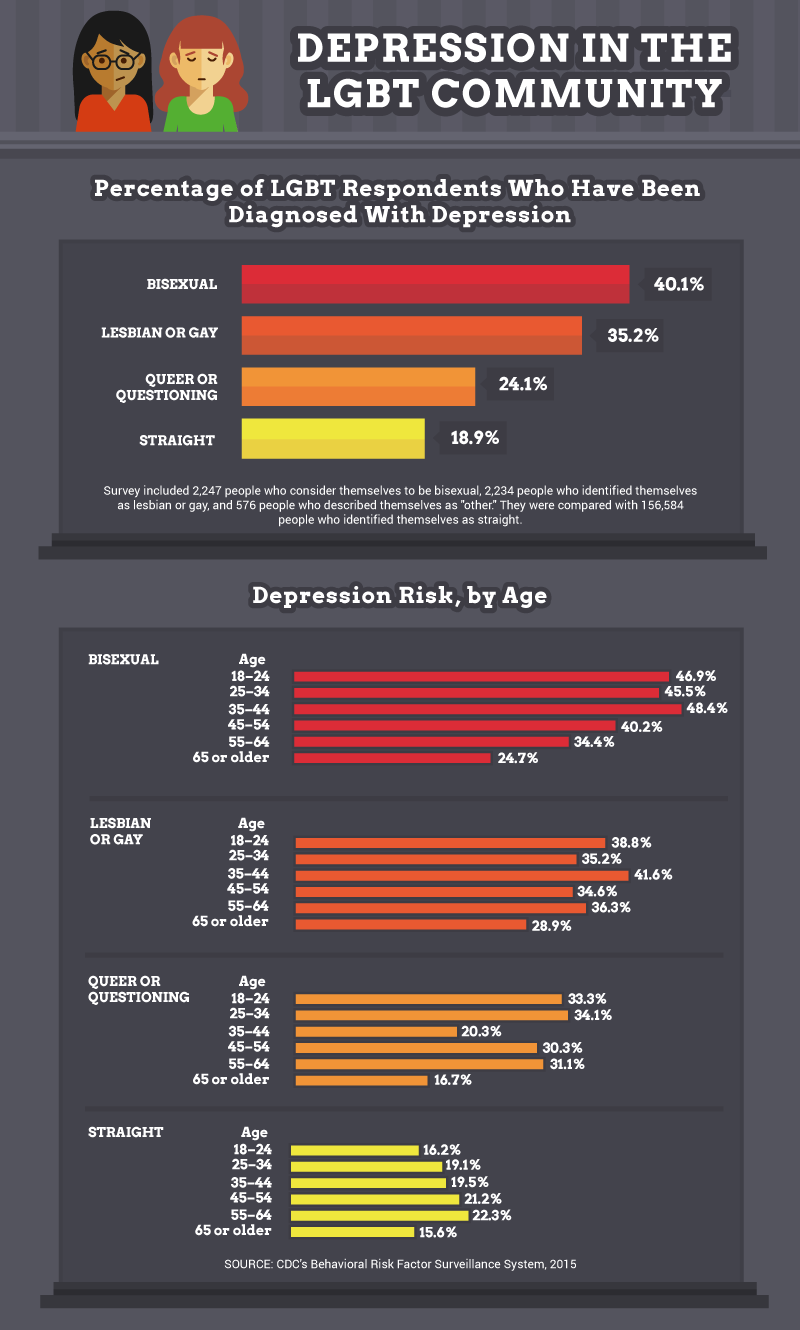
Therapists are Standing By to Treat Your Depression, Anxiety or Other Mental Health Needs
Explore Your Options Today
Ad
Roughly four out of 10 people who identify as bisexual report having been diagnosed with depression – a rate even higher than the one-in-three gay and lesbian Americans who have experienced depression, and more than double the rate of those who identify as straight. Our interviews with community members show that their sexual orientation or gender identity can significantly influence their experiences with depression. The secrecy of personal struggles exacerbate these symptoms, while the opportunity to be open and supported in their identity often helped relieve their condition.
“I think coming out to myself and to (select) others really helped ... It was like a weight lifted off me – keeping all those contradictions bottled up must have been a tremendous source of stress itself.” – Andrew*, bisexual cisgender man, age 54
*Names have been changed to protect privacy.
This risk is particularly high for young people, at least in part because of teasing and bullying in school. According to the CDC, the increased risk of depression in LGBT youth is connected with bullying behavior. Students who reported the highest levels of happiness, regardless of their orientation, were those in a “positive school climate” and “not experiencing homophobic teasing.” Many of our younger respondents reported that a hostile and homophobic, or transphobic, school environment inflamed their distress.
“... It was rare to make it to the end of a hallway of people without hearing at least three homophobic or transphobic slurs. A classmate of mine came out of the closet as gay and was harassed regularly to the point of dropping out of high school.”
– Jessica, pansexual transgender woman, age 22
Social and Emotional Support
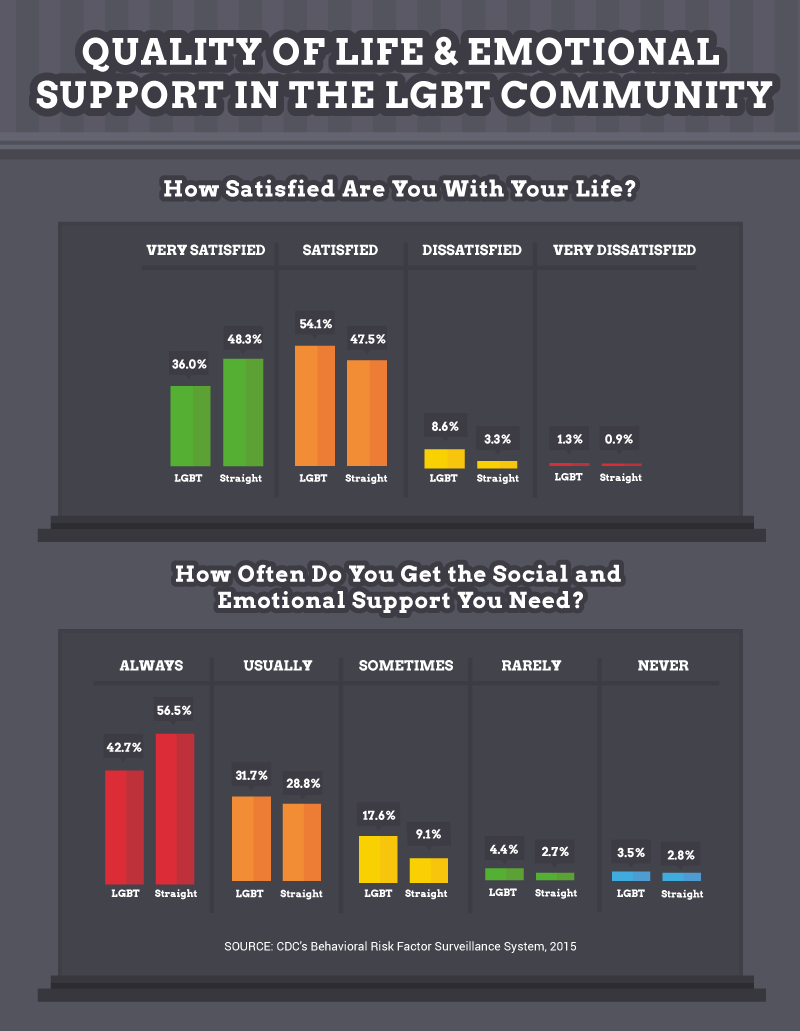
“We go through each day afraid that someone will hurt us because of who we are.”
– Nicole, lesbian transgender woman, age 43
When asked about their satisfaction levels with social support, emotional support, and their overall lives, members of the LGBT community reported their lives as generally satisfying and supportive. These results are, however, still slightly lower than those of straight individuals – 48 percent of whom reported being “very satisfied” with their lives, compared with 36 percent of LGBT individuals. Our respondents who noted a lack of support from their communities and health care providers often reported being isolated due to being misunderstood or even feared by others.
“I lacked the courage to say, ‘I don't talk about myself because I have a girlfriend, and I've heard what you said about gay people.’ I just try to get through every day without being fuel for the office gossip mill.” – Melissa, bisexual cisgender woman, age 32
“Since coming out as trans, I have lost nearly every friend I have ever had, most of my family no longer speaks to me ...” – Laura, transgender woman, age 35
Although many experienced an unwelcoming larger community, some found great value in constructing personal networks of support with others in the LGBT community.
“I'm fortunate to live in San Francisco, which is very LGBT-friendly … I think LGBT communities are more accepting in general of therapy, and less judgmental about it.”
– Emily, bisexual cisgender woman, age 54
“... Connecting with other trans people has been the single most important factor in reducing my isolation. Other trans people are able to relate to me in ways that my health care providers and family members (who are all cisgender at this time) don't.”
– David, bisexual transgender man, age 27
While we clearly still have progress to make in the social and emotional support arenas, the general feeling of satisfaction among the LGBT community is a positive sign. This could be, at least in part, due to an increase of resources for LGBT individuals and especially youth and an increasing acceptance of the community by the general population: while 20 years ago, nearly two-thirds of Americans did not believe same-sex marriage should be legal, the same proportion now support its legality.
Health and Support in the Transgender Community
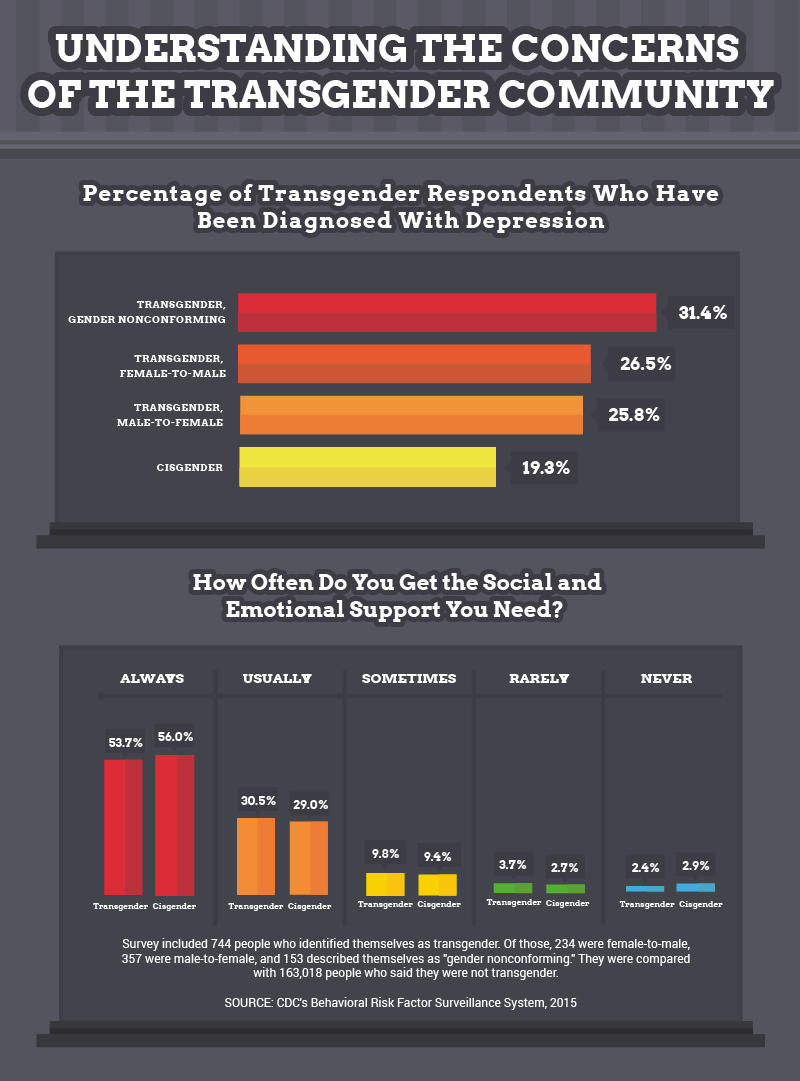
When we look at data for the transgender community specifically, we find that about a third of those who are “gender nonconforming” have been diagnosed with depression, with rates slightly lower for those who made the transition from male to female or from female to male. During our interviews, some members of the community made clear that a lack of support available for their transition often contributed significantly to making their depression worse.
“I believe my depression could have been far less severe if there were more resources available regarding gender dysphoria and treatment ...”
– Jessica, pansexual transgender woman, age 22
“The therapy to help with my PTSD was actually quite good and helped long term … However, I was constantly misgendered ... I received greater support from other patients regarding my transition than I got from my therapists.”
– Heather, transgender woman, age 22
The majority of our respondents; however, marked that they felt supported which helped to reduce their symptoms of depression, anxiety, and overall distress.
“Now, I have good support, as my psychologist is gay and welcoming. There is no barrier to get over. My gender fluidity is not a problem! It is helpful to have someone acknowledge me for who I truly am.”
– Chris, gender-nonconforming bisexual, age 57
LGBT Alcohol Use and Health Risks
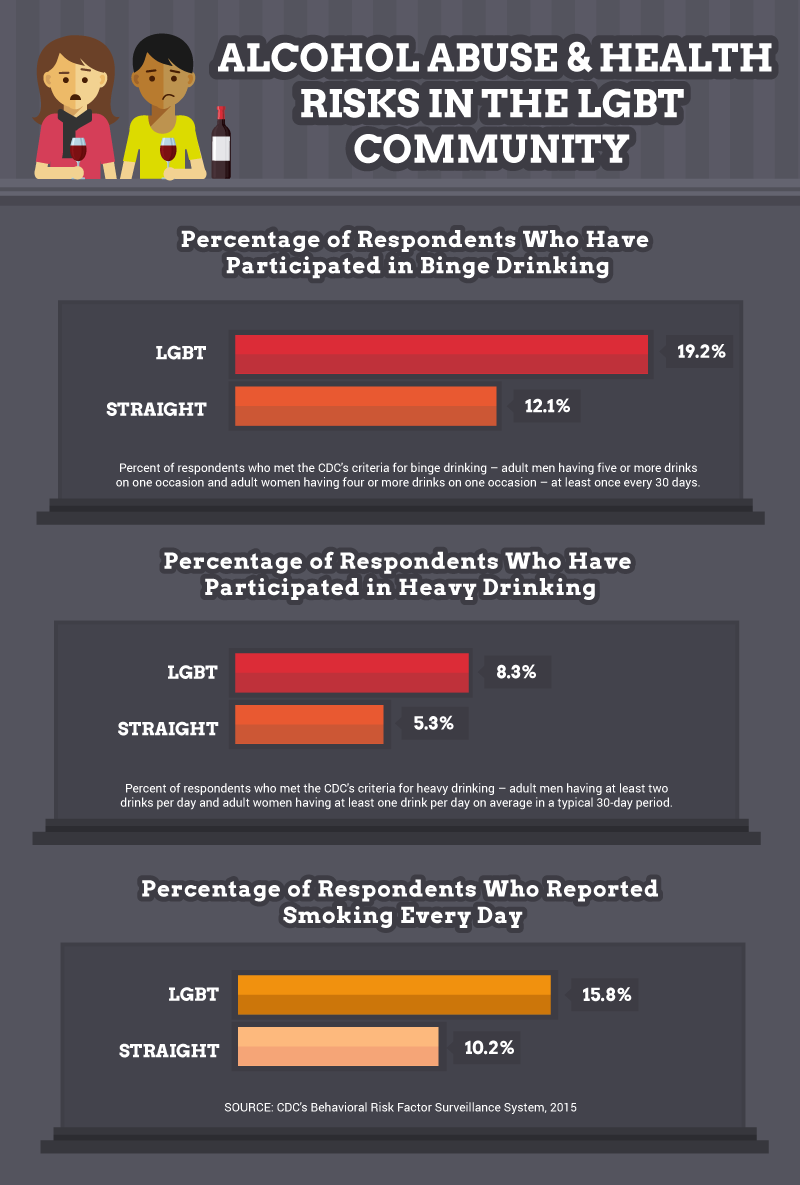
Although there are some encouraging signs that society is becoming more supportive of different sexual orientations and gender identities, life can still be difficult for people who don’t fit into typical social norms. Members of the LGBT community report, on average, higher rates of binge drinking and heavy drinking than those who identify as straight. Both binge drinking and heavy drinking may, over time, contribute to the development of alcoholism and substance abuse. Some of our respondents pointed out that their substance and alcohol use was an intentional strategy to cope with the distress of living in an unwelcoming society.
“... I have used substances in the past to try to deaden the pain. Sometimes this has been a direct action after suffering as a gender minority and being treated as if I do not have value.”
– Chris, gender-nonconforming bisexual, age 57
Members of the LGBT community are also one and a half times as likely as straight people to be daily smokers, and responses from those we interviewed suggested that this too was a coping mechanism.
“I have never smoked cigarettes – I specifically started vaping in the hopes that nicotine might be another strategy to cope with dysphoria and depression while I wait to be able to access the surgery I need.”
– David, bisexual transgender man, age 27
Depression, Hopelessness, and Sleep Difficulties in the LGBT Community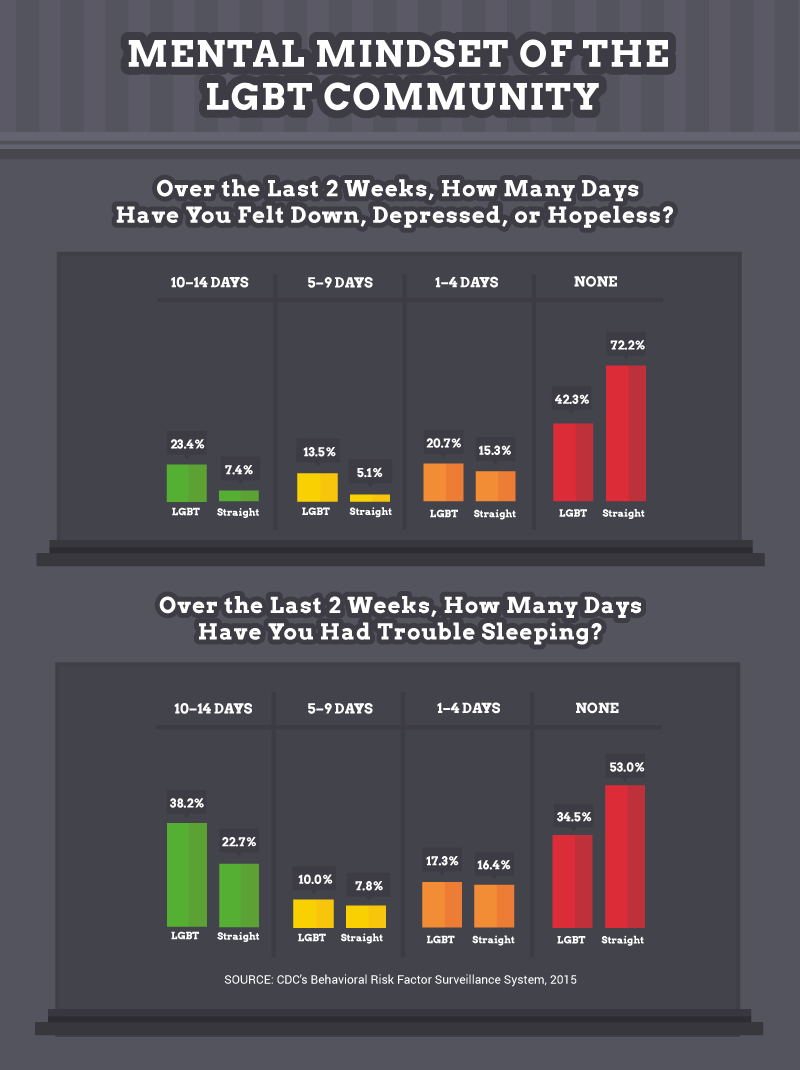
We all know that sleep is an important piece of our overall health. It plays a part in healthy brain function, helps us emotionally cope with day-to-day stresses, and keeps our hearts, kidneys, blood pressure, blood sugar, and weight healthy.
Our analysis found some troubling results when we looked at day-to-day concerns, like sleep and feelings of hopelessness and depression. In the last two weeks, members of the LGBT community were nearly three times as likely to report having recurring feelings of depression and hopelessness than straight respondents. They were also one-third more likely to have had trouble sleeping.
“When my anxiety is quite high, sleeping is more difficult, so I tend to sleep less during those times – on the opposite side, when my depression is getting worse, I sleep more often.”
– Josh, bisexual cisgender man, age 23
The good news is that, for many of our respondents, engagement with supportive mental health care services often improved their symptoms of depression, as well as sleep disturbances.
“In the past, I often had trouble sleeping due to PTSD-related nightmares, but therapy helped, and now I sleep quite well.”
– Heather, transgender woman, age 22
Does Environment Impact LGBT Depression?
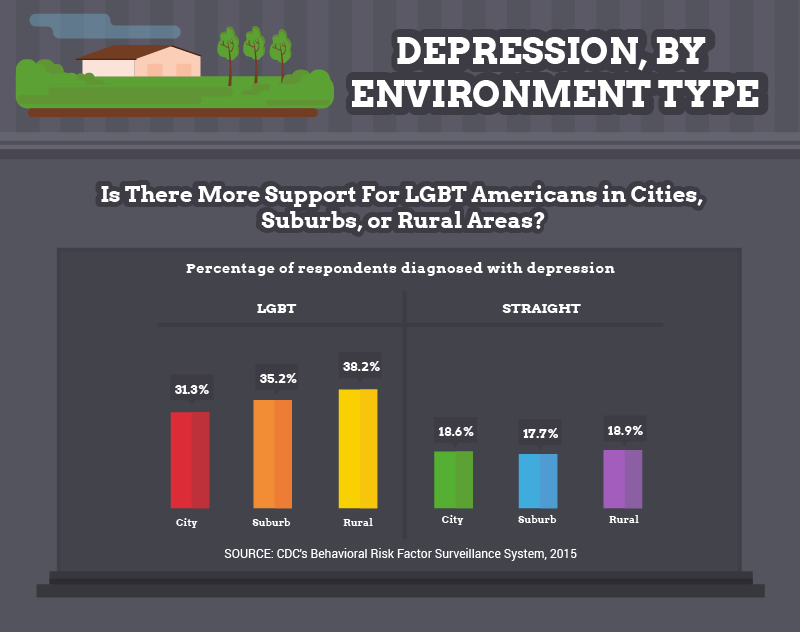
For straight Americans, differences in rates of depression between urban, suburban, and rural environments were almost nonexistent, while for LGBT Americans, their location seemed to play an important role in mental health. Data show that city living carries a lower risk of depression than rural living (with 31 percent of city dwellers reporting depression, compared with 38 percent of rural residents). Themes of isolation in their surrounding communities were very common among our interviewees.
“Being unable to construct my own identity because there were no voices I could relate to is probably one of the primary factors for my mental health struggles.” – Rebecca, bisexual cisgender woman, age 41
“Because everyone has an opinion about being transgender, it causes a barrier from any kind of outreach to others.”– Brittany, straight transgender woman, age 24
These findings seem to support those who argue that “the equality divide we face is no longer between red and blue states, but between urban and rural America”, as described by author and activist Silas House in the New York Times. Rural America still has a long way to go to close this gap and create support and well-being for its LGBT communities.
Anyone can experience depression or addiction at any stage of life. But for young people coming to terms with their sexual orientation or gender identity, the risk is even more significant. That’s why it is especially important to have the support of friends, family, and community. As our interviews show, an understanding community and health care system go a long way toward directly improving the health of LGBT individuals.
“We feel the same, we love the same, we hurt the same … We just need to be treated with care and understanding and respect.” – Nicole, lesbian transgender woman, age 43
Our research found that there are signs of improvement for the LGBT community, and many people are living satisfying lives with friends and family who love and support them. However, there are still plenty of stresses and challenges that the LGBT community faces.
People who are bisexual or gender nonconforming – who may not be comfortable within some of society’s usual labels – are at a higher risk for depression, substance abuse, and other mental health problems. It’s important that we, as a nation, pay attention and provide support where we can. This includes getting friends or family members struggling with addiction the support and help they need, being there for them when they need to talk, and being supportive and respectful of their life choices. At Mentalhelp.net, we offer referrals to treatment centers and counseling services that are tailored to meet your needs, including services with experience and expertise with the LGBT community. If you’re struggling with life’s challenges, know that help is here for you. Visit Mentalhelp.net today, and find hope for a better tomorrow.
SOURCES
Methodology
Our study was based on the Centers for Disease Control’s 2015 Behavioral Risk Factor Surveillance System survey, which was released in August 2016.
We analyzed 434,382 records based on comprehensive interviews with people in all 50 states and the District of Columbia. Not all survey respondents were asked all questions. However, more than 160,000 people responded to questions about sexual orientation, depression, and risk factors, including alcohol consumption.
Respondents included 5,088 people who identified themselves as lesbian, gay, bisexual, or
queer/questioning, and 744 people who identified themselves as transgender.
Glossary of Terms
Bisexual, or bi: Describes a person who experiences romantic, emotional, or sexual attraction to the same gender and other genders, whether to equal degrees or to varying degrees.
Pansexual, or pan: Describes a person who experiences romantic, emotional, or sexual attraction to persons of all gender identities or sexes.
Transgender, or trans: Describes a person whose self-identified gender does not fully align with their physical sex as assigned at birth, and who may choose to take steps to medically alter the gendered features of their body. May more broadly describe a person whose gender identity or gender expression diverges from conventional social norms and expectations of gender.
Cisgender, or cis: Describes a person who is not transgender, and whose identified gender also aligns with their sex as assigned with birth.
Gender Nonconforming, or GNC: Can describe a person whose identified gender is expansive beyond the binary of male or female.
(https://www.pflag.org/glossary)








